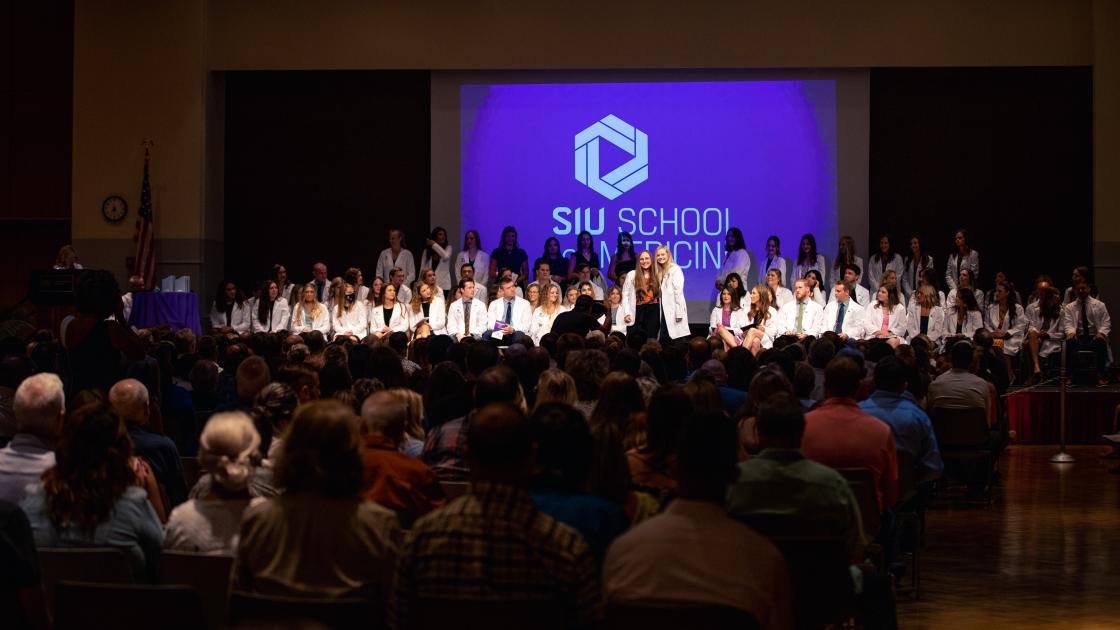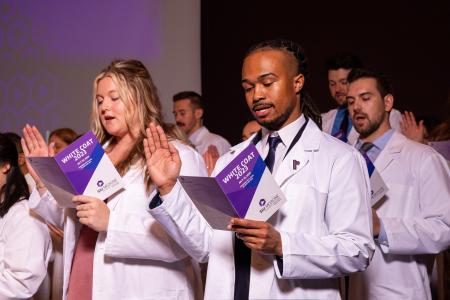
Physician Assistant Program Mission and Goals
Mission
The mission of the Southern Illinois University School of Medicine Physician Assistant Program is to educate medical professionals who provide care to all populations with an emphasis on medically underserved, rural, and health professional shortage areas. We enhance healthcare by preparing medical providers dedicated to both community and profession. We promote an all-inclusive environment that fosters creative thinking and communication skills in our pursuit of excellence.

Goals
SIU utilizes the Barrowsian Problem-Based Learning (PBL) method for the delivery of the core of the curriculum. PBL encourages critical thinking, self-directed learning, synthesis and application of knowledge, and problem-solving skills. Cases are based on real patient encounters and students spend greater than 600 hours in PBL small group classes. During the course of the curriculum, students work through cases that include hundreds of differential diagnoses, related anatomy and physiology, pathophysiologic concepts, microbiology and biochemistry, genetic basis of disease, labs and diagnostics, and treatment options including pharmacotherapeutics, clinical interventions, patient education, as well as behavioral, social, legal, ethical and population health issues.
With hundreds of clinical sites available, Phase I, II, and III students are assigned to supervised clinical experiences which help prepare them for medical practice as they apply didactic concepts to actual patient encounters. Preceptors and mentors consistently rate students as exceptional in their abilities. Additionally, graduates who complete exit surveys overwhelmingly report that SIU prepared them to begin practicing as a PA and to be lifelong learners.
Since the first graduating class in 1999 the SIU PA Program graduates have achieved over a 99% overall pass rate on the National Commission on Certification of Physician Assistant (NCCPA) exam as first-time test takers.
Phase II students in the SIU PA Program are assigned to Hub sites throughout central and southern Illinois and southeast Missouri for their clinical rotations. These Hub sites are located in: Belleville, Cape Girardeau, Carbondale/Delta Region, Champaign, Decatur, Mattoon, Olney, Peoria, Quincy, and Springfield. The clinics associated with these Hub sites are located within the community and surrounding area.
The SIU PA Program has sent approximately 200 students to rural and medically underserved clinics over the past five years. The number of patient encounters completed by Phase II students during clinical rotations has been greater than 1200 per student per year. Additionally, graduates who complete exit surveys overwhelmingly report that SIU prepared them to provide people who are medically underserved with respectful, ethical, professional, and competent care. Over 50% of our graduates have practiced in rural areas and with people who are medically underserved.
Southern Illinois University Physician Assistant (SIU PA) students develop the skills for effective communication with other health care professionals, patients, and their families throughout the tenure of the program. Our students learn how to improve their interpersonal and communication skills when working in small PBL groups throughout the program. In addition to didactic education, Phase I students complete approximately 120 hours of patient care with a clinical mentor.
In Phase II, students complete nine clinical rotations as well as a weekly primary care Continuity Clinic. Preceptors have consistently rated the performance of our students as exceptional in the areas of patient rapport and professional relationships. Additionally, graduates who complete exit surveys overwhelmingly report that SIU prepared them to effectively interact with physicians, allied health personnel, patients, and families while adhering to the concepts of privilege, confidentiality, and ethical behavior.
Program Defined Competencies
In 2023 the SIU PA Program Competency working group developed and updated program required competencies for the entry level PA. These competencies are consistent with and adapted from the competencies defined by the PA profession. The following competency domains and competencies are linked to specific course objectives in program syllabi, problem-based learning issue lists, and evaluation tools.
- Patient-Centered Practice Knowledge (PCPK)
- Interpersonal and Communication Skills (ICS)
- Patient Centered Care (PCC)
- Professionalism (P)
- Practiced-based Learning and Improvement (PBLI)
- Systems-based Practice (SBP)
- Understand and apply patient-centered knowledge in the areas of basic science principles, clinical medicine, pharmaceutical therapeutics, behavioral and social sciences issues, medico-legal issues, health maintenance, and formulate differential diagnoses to build the foundation for professional physician assistant practice. (PCPK, P)
- Develop the technical skills necessary for critical review of the literature. (PBLI, PCC)
- Apply knowledge and exercise autonomy in medical decision making to provide a broad range of diagnostic and therapeutic interventions based on patient information and preferences, current scientific evidence, and informed clinical judgment. (PCPK, PCC)
- Utilize interpersonal and professional skills to work effectively with physicians and other health care professionals to provide quality, efficient patient-centered care.
(ICS, PCC, P, SBP)
- Demonstrate independent thinking, while reinforcing the concept of team practice, when making diagnoses, clinical decisions, and constructing patient management plans. (ICS, PCC)
- Use interpersonal skills to create and sustain a professional, compassionate, and ethically sound relationship with patients and their families. (ICS, P, PCC)
- Use effective interpersonal and communication skills to elicit information and provide education to patients and their families. (ICS, PCC)
- Professionally embrace and promote equity and inclusion in race, ethnicity, gender identity, sexual orientation, disability or special health care needs, socio-economic status, and religion while addressing system biases that contribute to health care disparities. (P, SBP)
- Use knowledge gained through education, research, and administrative activities in the provision of services within primary and specialty care, medical and surgical practice, and in rural and urban areas. (PCPK, PCC, SBP)
- Actively seek to expand knowledge by utilizing technical and self-directed learning skills to keep current with research and advances in medicine appropriate to the role and responsibilities of the certified physician assistant. (PBLI, PCPK)
- Use interpersonal and problem-solving skills to recognize and appropriately resolve ethical issues encountered when practicing as a certified physician assistant such as diversity, confidentiality, genetic and reproductive decision-making, professionalism, and medical ethics as they relate to the physician assistant in clinical practice. (P, ICS)
- Demonstrate attitudes that promote professional relationships with collaborating physicians and other health care professionals as a member or leader of the health care team. (ICS, P)
- Apply innovative technology in web-based education and distance learning to meet future career goals, including continuing medical education, practicum, or work experience in medicine. (PBLI)
- Utilize clinical and technical skills to provide quality, cost-effective patient care and advocate for equitable distribution of health care resources. (SBP, PCC)
- Understand the principles and content of the discipline and use professional behaviors and interpersonal skills to advocate for and enhance the role and utilization of physician assistants in the health care system. (P, SBP)
Statement of Inclusion, Diversity, and Equity
Anti-racism is the active process of identifying and eliminating racism by changing systems, organizational structures, policies and practices and attitudes, so that power is redistributed and shared equitably. An anti-racist organization is one in which racism is actively opposed and in which justice and fairness are actively promoted. SIU Medicine is committed to be an organization that fully embraces and promotes equity and inclusion in race, ethnicity, gender, sexual orientation and socio-economic status. SIU Medicine will identify, address and minimize overt and implicit bias. SIU Medicine pledges to be an anti-racist organization.
